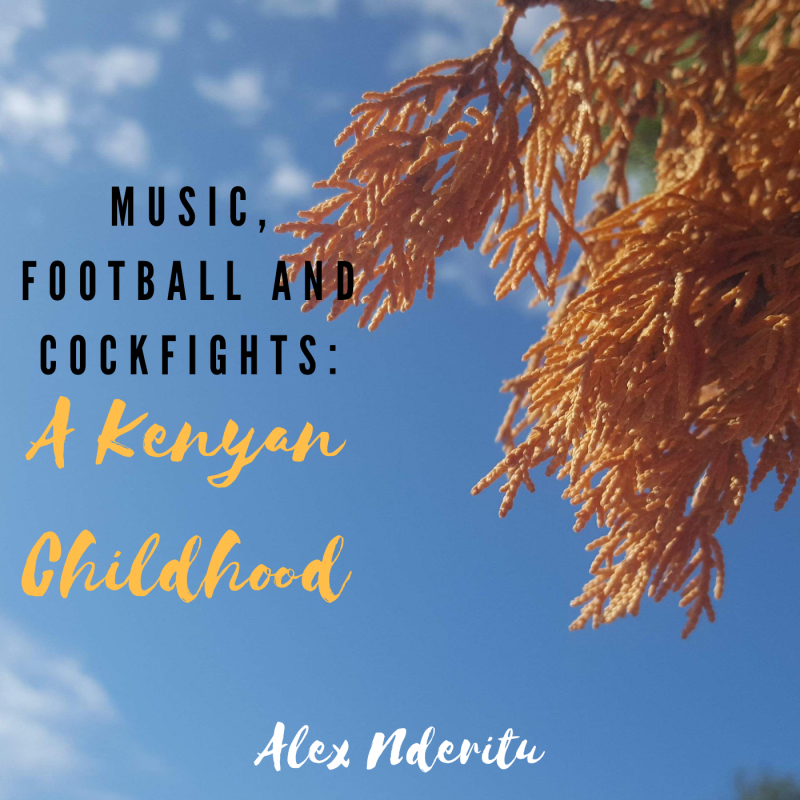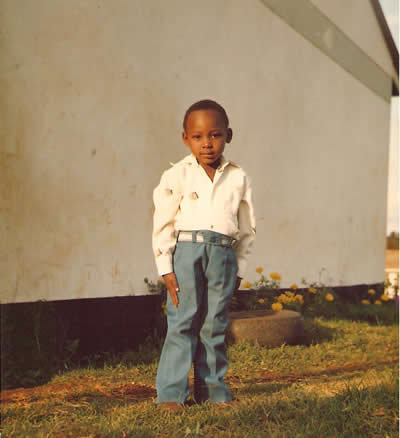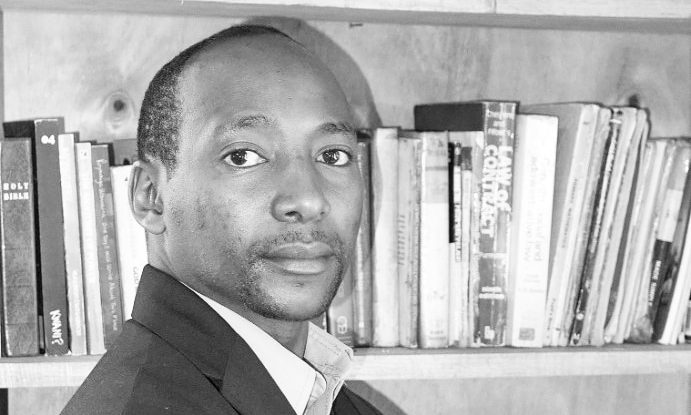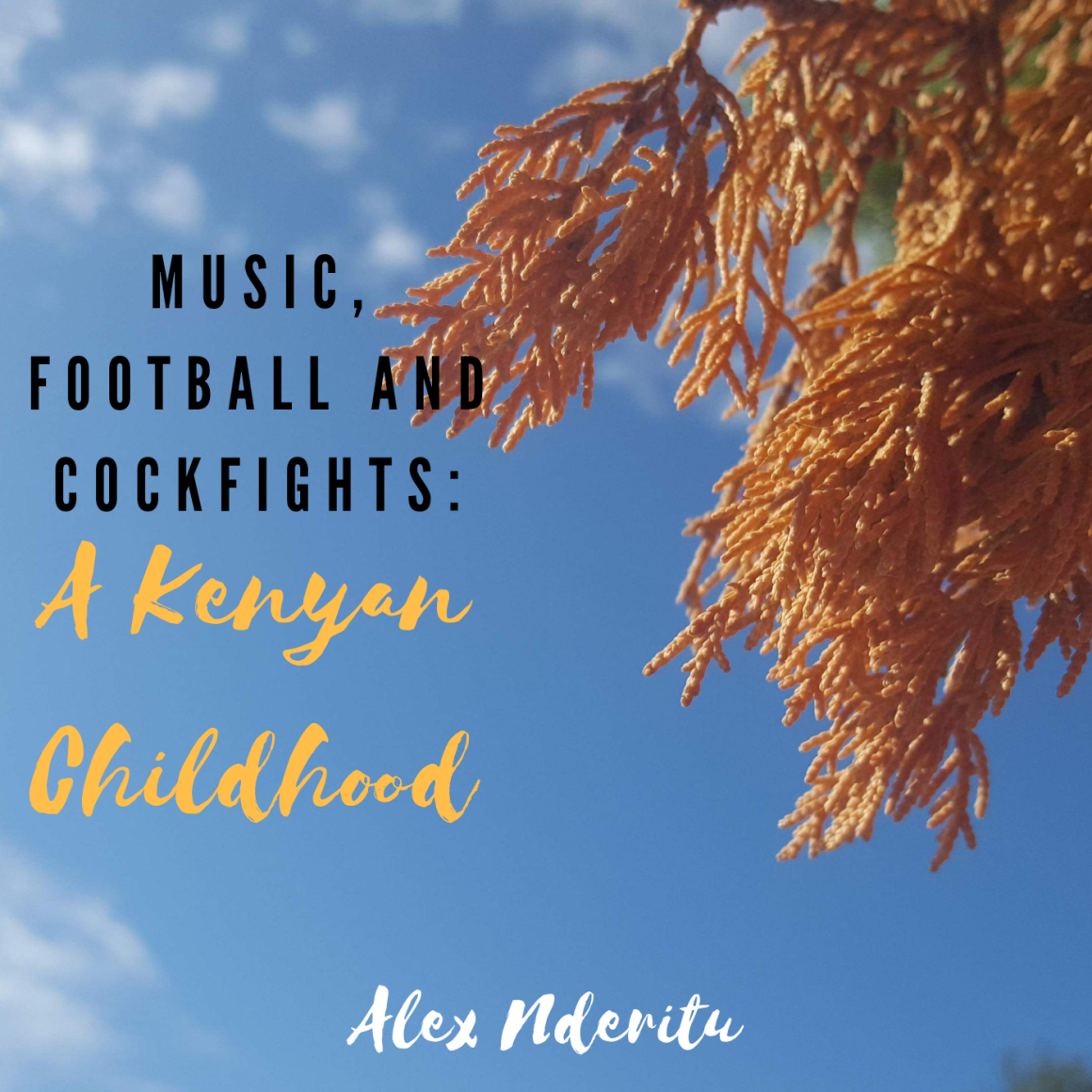
‘Nearer to Nyeri, nearer to bliss.’ – Lord Baden Powell
I was born in Nyeri County, Kenya, on William Shakespeare’s birthday. I didn’t know I shared a birthday with the bard until I was around 17. My older sister, Wanjirũ, had studied Romeo and Juliet as a ‘set book’ in high school, and one day she realised that, according to the author bio, one of the greatest English writers was also born on the 23rd of April.
Speaking of birth, I arrived two weeks later than expected. My nails had grown long and I caused my mother considerable discomfort (although, as it turns out, it wasn’t the last time I overstayed my welcome!) When I finally arrived, kicking and screaming, I had a jet-black shock of curly hair, and my nails needed to be clipped. The hospital I was born in is called Mt. Kenya Hospital. The mountain itself is clearly visible from any point in Nyeri county, and from far beyond. It is the second tallest mountain in Africa, and was sacred to my tribe, the Agikũyũ, who believed that God (Ngai) lived there. The Agikũyu referred to the mountain as ‘Kĩrĩma kĩa Nyaga’ (‘The Ostrich Mountain’). The ostrich reference came about because the three grey peaks of the mountain are spotted with milk-white patches of snow, reminiscent of the male ostrich and its white tail feathers. Incidentally, the country is named after this majestic volcanic mountain, not the other way round. Nyeri town is not physically imposing, but it breathes history and wields impressive political influence nationwide. World-famous ‘Nyerians’ include freedom fighter, Field Marshal Dedan Kimathi, Nobel Peace Prize winner, Wangari Maathai and 3rd Kenyan President Mwai Kibaki. The first Catholic to be beatified in Africa, Blessed Sister Irene Stefani; the founder of the global Boy Scouts movement, Lord Baden Powell, and his wife Lady Olave Powell who was also the founder of the Girl Guides, all lived in Nyeri when the country was under British colonial rule. The earthly remains of the Powells are still buried there, not far from his former residence (which was dubbed ‘Paxtu’ and is currently part of the Outspan Hotel complex). My mum was a Girl Guide official and rose to the rank of ‘District Commissioner.’ Sometimes, my siblings and I would visit her in her office directly opposite the local Kenya Power and Lighting Co. offices. (KPLC is a government-owned electricity distribution monopoly that had power outages so often that its nickname was ‘Kenya Pressure Lamps and Candles’.)

The majestic Mt. Kenya
Both my parents were career teachers. They met in Ndũgamano Secondary School, where they were both working at the time. My late dad was the headmaster and mum was an Untrained Teacher (UT), still completing her degree at Kenyatta University in Nairobi. There were 10 years between their ages. When mum completed her degree and was employed in another school as a Physics & Chemistry Teacher, they got married. I was in the womb on the wedding day and, evidently, not in a hurry to leave.
We lived in various teacher ‘staff quarters’ throughout my youth, and my parents were sometimes posted to separate districts by the Teachers Service Commission (TSC). My earliest memory is of looking out of a window in our house at the Nyeri Technical Training College where mum was then teaching Physics. I was about 5 years old. I remember the landscape being awash with sunlight. And I remember hearing music.

Alexander Nderitu, at the ripe old age of 3, at the Nyeri Technical College staff quarters
There were several rows of identical, fenceless, houses, so there were plenty of kids our age to play with in the years that we lived there. Our next-door-neighbours’ kids even went to the same school we did, so we had plenty in common. We, therefore, played all the popular childhood games in Kenya: hide-and-seek, marbles, hunia (‘Tag, you’re it’), ‘Kiss, Command or Promise’ and so on. Another thing we boys did was roll rimless car tyres to the top of a gentle slope, fill them with soil and then push them downhill and watch as dust billowed out from the sides. But the one game I remember most clearly was kicking a football against the neighbour’s white wall as if we were playing a primitive game of squash. Years after we moved out, that wall was marred by multiple round brown stains.
While my parents’ work places changed, as they did every few years, one thing remained constant: our rural home in Tetu, Nyeri County. It was our ancestral land in a hilly, agricultural environment. Virtually everyone within a five-kilometre radius of our rectangular one-storey house was a relative of some sort. My guka (grandpa) and cũcũ (grandma) lived across the valley, separated by coffee and tea plantations. Apart from the cash crops, we reared cattle, which was much more fun for me than plucking coffee during the December holidays. Most of our cows were brown, but one large Friesian heifer was black and white, the dark areas like poorly-drawn continents on a world map. I liked the way the cows smelt, especially when they were feeding. I would sometimes help the workman give them fodder. Their mouths were as oblong as the geometric sets we used in school and ringed with rectangular teeth. Sometimes, I would climb right into the pen and pet the gigantic herbivores, running my fingers through their hard curly hairs and plucking out grey ticks which I promptly speared to death using small sticks. I also enjoyed watching the workman milk the cows in the evenings, talking to them and whistling as the white liquid hit the inside of his metallic bucket with a rhythmic sound.
The academic system we had then was dubbed 8-4-4, and I spent all 8 years of my primary education at Nyeri Primary School, a coveted colonial-era British-built school that produced some of the best-performing Kenya Certificate of Primary Education (K.C.P.E) candidates in the country. It occupied a vast area near a cliff which broke off into a densely populated valley at the bottom of which the Chania River slithered like a giant silver serpent. Apart from the administration and tuition blocks, the school boasted a glass-walled assembly hall, a swimming pool, boarding facilities, two massive dining halls, four grass-covered playing fields, staff quarters, and numerous trees and flowers. Some of the trees were jacarandas that would seasonally erupt into a purple hosanna, displaying little bell-shaped flowers that individually spiralled to the ground. Pupils scrambled to catch the falling flowers, believing that it would bring good luck, especially during examinations.
Circa 1990, when I was 11, my brother Karuri and I unwittingly initiated ‘The Rubber Band Wars’ at school. Dad had purchased numerous packs of rubber bands, probably for his school staff room. We took some boxes and seeing as how there were about 100 bands in each pack, it was quite a haul. I shared them liberally in class the next day. Girls wore them like the multiple bangles of a traditional Indian dancer. The boys were more creative. They quickly discovered that one could make a catapult by placing a rubber band between the thumb and index finger. For a payload, they folded little bits of paper, and then began zapping each other! During the breaks, the zapping continued as did the sharing of the rubber bands with pupils from other classes. The chaos I had unleashed in my class was duplicated in my brother’s class and soon paper projectiles were flying everywhere. “You’d turn a corner and there’d be a guy with a loaded rubber band aiming at you!” my brother recalls. A teacher on duty got zapped one day and rubber bands were henceforth banned from the school.
Also around this time, dad was transferred to a school in Wanjohi, Nyandarua County, where he was to be the headmaster. He took us there during one holiday, in his long, white Peugeot 504. The songs that oozed from cassettes in the car radio during the long journey included That’s One You Owe Me by Johnny Cash, Eagle When She Flies by Dolly Parton, Memories are Made of This and Welcome to My World by Jim Reeves; Spanish Harlem by Jimmy Cliff, Wings of a Dove by Charlie Pride, The End of The World by Skeeter Davis, and many more country music standards. God, I loved those songs! I still do. As we neared our destination, the Peugeot got stuck in the clay-rich mud. It looked like it rained a lot there. The nearby mountains were enveloped in a petticoat of mist. Dad and some charitable passers-by shoveled off the mud in front on the wheels, exposing the dryer stony ground, for the vehicle to fish-tail out of the quagmire.
The dominant geographical feature in Nyandarua is the Aberdare Range, a 160-kilometre-long chain of mountains. There was a lot of clay in the earth. Near the headmaster’s residence, in which we lived, my brother and I discovered deposits that were almost as pure as commercial plasticine. We spent the next few days molding little objects – such as crocodiles, elephants and cars – and applying Vaseline for a smooth finish. I got into a tiff with Wanjirũ when she tried to help me with one of my crocodiles, saying that it was so thin it looked “like a lizard.” I took a peek at Karuri’s model and realised she was right, but I added more clay to the abdomen without her assistance.
Another activity for Karuri and I was watching cocks fight. We had never realised how brutal chickens could be. None of the fighters were particularly large specimens, but they had verve. Almost every day, two slim youngish cocks would approach each other, like professional boxers when the bell rings, and size each other up with the feathers around their necks raised. They would then lunge forward and utilise their talons and beaks to inflict maximum damage. Their narrow faces would be covered in blood afterwards and the loser was often mauled half to death. We never interfered in the fights. If I’m not wrong, we encouraged them by herding cocks closer together because we wanted to see “which one will be the winner.”
We found playmates in some neighbouring children. The girl was about our age, black as sin, and very talkative. Her brother was much younger – maybe two or three – and could barely speak. The girl was rather naughty. One time, she spun around, swishing her skirt towards me. She had the blackest butt I have ever seen. Her baby brother was not so much a playmate as a plaything. We loved to hide – usually round a corner – and then suddenly jump in front him with our arms raised, like the feathers of the fighting cocks, and give him a fright! The ruse worked every single time.
Back at school, my favourite sport was soccer, although I also excelled in foot races. Soccer is referred to as ‘football’ here and is not to be confused with “American Football” which is literally a different ball game, played, you might say, by men with odd-shaped balls. From what we saw on TV’s The Gillette World of Sports and The George Michael Sports Machine, the American version of “football” was more like “handball.” Soccer is the world’s most popular sport, although it has never caught on in North America. I can remember my big sister and I falling over ourselves in laughter while watching a vox populi segment on CNN where random Americans were asked if they knew who Maradona was. One talking head said: “Yes, I like her music.” (He was apparently confusing the Argentine soccer legend with pop singer Madonna.)
Elsewhere, however, soccer is almost a religion. During school days, every break was a soccer break for us boys. And since we didn’t have unfettered access to the school’s supplies, we made our own balls using compressed papers, polythene bags, and nylon strings. Makeshift goal posts were designated using pullovers or shoes and referees were as rare as European royalty at a reggae concert. The name of the game was to have a good time. Off-sides and other minor contraventions often went uncalled. Teamwork also took a blow because everyone was over-eager to score. And since our female counterparts often watched from the sidelines, “score” was a word that loomed large in our pubescent minds. Those who were quick on their feet would avoid the main body of players and instead dart along the edge of the field, kicking the ball ahead of them as they went, while the slower ones mastered the art of dribbling and faking moves, only passing the ball when they were cornered by the opposition. Being a “fast runner,” I was one of the fellas speeding along the rim and trying to get to my opponent’s goal area before they caught up with me.
When I was around 14, we moved to a semi-detached house overlooking Rũring’ũ Stadium in Nyeri (where Mau Mau freedom fighters surrendered their weapons after the British Empire granted us independence). The next-door neighbour was our landlady and had a soft-haired daughter called Wambũi who was about three years younger than me. One day, the landlady watched Wambũi and I squabbling over some minor thing and laughingly said, “You know you two are going to marry each other some day?” Well, we never did, but she was the first girl I ever kissed on the mouth. We used to make out in her mother’s garden, shielded by maize stalks taller than us, and it was bliss.
After some years, my family moved out of the Rũring’ũ residence and relocated to the more rural staff quarters of Mahiga Girls Secondary School where my mum had been upgraded to Deputy Headmistress. I should have kept in touch with Wambũi, but for some reason I didn’t. Our families remained close even after the transfer. I was buddies with her brothers, and her mother was like an aunt me. I guess I took it for granted that she would always be within reach, so there was no need to overexert myself. I never sent any letters to her when she was in high school; not even a Kenya Certificate of Secondary Education (K.C.S.E.) examination “success card.” If there were any mistakes in that relationship, then they were all mine. Wambũi still lives in Nyeri today, and is married with two children. Mighty Sparrow’s rendition of Only a Fool (Breaks His Own Heart) plays in my head whenever I remember her.
Mighty Sparrow is a prolific Caribbean singer-songwriter who wore the ‘King of Calypso’ crown for many years in his illustrious career. One of his hits, Mr. Walker — about a man pleading for a supposedly Caucasian girl’s hand in marriage, is a staple for Kenyan one-man guitarists, popular referred to as “Mũgithi artistes.” I discovered Calypso music when I was about 12 years old. There was only one television station (the Voice of Kenya, now Kenya Broadcasting Corporation) so it used to show a very wide variety of shows in order to cater to the population’s varied tastes. One time, there was a documentary of either the Caribbean or just Calypso music and there was this skinny black dude in a hat joyfully singing, ‘If your mother and your wife were drowning / I want to know which one you would be saving…’ I always remembered the singer’s name because it was so unique – Lord Kitchener. (And I now know that the song is titled Wife and Mother.)
All students in Nyeri Primary belonged to one of four sports teams, or “houses,” designated by a particular t-shirt colour: Lion (Yellow), Cheetah (Red), Leopard (Blue) and Tiger (Green). It’s interesting that I was in Leopard House because the spotted leopard has always been my spirit animal, even though my star sign is Taurus (‘The Bull’). Once a year, the school would hold a colourful and exciting “Sports Day” during which the faculty, student body, parents and visitors would watch the four Houses compete for trophies and glory. In my last year there, I was part of Leopard House’s participating team, chiefly involved in the 200-metre relay and the tug-of-war. It was a glorious day – shot through with colour, noise, glamour, pomp, and pageantry, but for some reason, I couldn’t perform as well as I had in previous sporting events. To make matters worse, a sprinter from Cheetah House controversially ended up lifting the most coveted trophy, even though he had clearly been outshone by a representative of Leopard House, particularly in the 100-metre dash.
After underperforming on Sports Day, I set my eyes, quite literally, on another goal: to go out as a football star. Finding the back of the opponents’ net in impressive fashion became as important to me as passing the final exams, which would have alarmed my parents if they knew. I watched countless hours of Football Made in Germany and other televised soccer presentations in order to learn more about scoring tactics. How far away from the goal should one go for the power shot? If you’re close to the goal, should you attempt to flip the ball past the goalkeeper or strike so hard that he has little time to react? These were the kind of questions that ran through my mind (unlike the classroom algebra, which went over my head). Of particular interest to me was a technique that is still commonly used by strikers when taking penalty shots. They come in, calm and collected, and kick the ball such that it lands in the opposite side from the one the goalkeeper dives towards. Many a penalty kick is scored in this style. I loved that move so much I just had to try it back at school.
I got my opportunity one day shortly before we sat for our final examinations, the K.C.P.E exercise that would determine which secondary schools we would join. We were using a hockey pitch rather than the much larger soccer field utilised on Sports Days because it was “home time” and the arena was adjacent to the car park. The relative smaller size of the goal made chances of scoring anorexic at best. In the course of the match, someone from the other side touched the ball with his hand and that being a capital crime in soccer, his team had to be punished through a penalty kick in their goal area. The striker was yours truly and I smiled with savage glee as I assumed my position a few metres in front of the confident goalkeeper.
Understand first that most goalkeepers handling penalty kicks keep their eyes on the striker, not the ball. That’s because a ball kicked at close range often moves too fast for a human being to intercept it. The goalkeeper stands more of a chance of making a ‘save’ if he can somehow anticipate your move and start jumping before the ball becomes a blur. As the kicker, your trick, then, is not to give away your intention. Your eyes and feet should not betray your real target. You then hit the ball with either side of your shoe, deciding the trajectory at the last moment. If your execution is true to plan, the ball goes off at a tangent and finds the corner of the goal opposite to the direction of your kick.
So there we were. A hockey pitch doing duty for a soccer field. Golden bars of sunlight falling from cloudy African sky. Everyone crowding around the goal area to witness the power shot. And me trying very hard not to let the goalkeeper see that I wanted to put the ball in the right-hand corner. I stepped back a couple of paces. I lurched forward in a curve. I deliberately grazed the ball with the right side of my shoe.
It was beautiful.
I remember it like it was yesterday: the goalkeeper and the ball flew in opposite directions and my teammates went wild! It worked even better than I had anticipated. You should have seen the look on the disgraced goalkeeper’s face as he sat in the wrong corner wondering how the ball could have ended up so far from him.
In his famous “Find Me in the Whirlwind” speech, Pan-Africanist, Marcus Garvey said: “The day when I forsake my people, may God Almighty say, ‘There shall be no more life for you.'” Yes, I’ve done some damage to the planet. We all have. I have made many wrong turns and caused emotional distress to some family members and friends. But, like Marcus Garvey, I have “found a new ideal.” My goal, now, is to not just repair the damage I may have done, but to compensate for it many times over. I unequivocally support peace initiatives, environmental conservation, and charitable organisations whenever I can. And if I ever cease to be a positive influence, then may Ngai, the God of my ancestors, say: “You have overstayed your welcome on this planet!”

Alexander Nderitu
is a Kenyan poet, playwright and novelist. His first book, When the Whirlwind Passes, has the distinction of being Africa’s first digital novel. Some of his writings have been translated into Swedish, Japanese, Chinese, Arabic and Swahili. In 2014, his poem ‘Someone in Africa Loves You’ represented Kenyan literature on Poetry Postcards distributed during the 2014 Commonwealth Games in Glasgow, Scotland. His fiction is available worldwide via the Worldreader app and devices. In 2017, he was named by Business Daily newspaper as one of Kenya’s ‘Top 40 under 40 Men.’ Nderitu is also the Deputy Secretary-General of Kenyan PEN and the Kenyan Editor of the international theatre news portal, TheTheatreTimes.com.
Cover photo credit: Tosin Taiwo


1 comment
it was an awesome read.